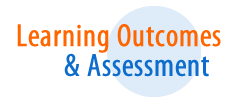Learning Outcomes for M.A. in Communication

Program Learning Outcomes:
- Discuss the Communication discipline, its organization, and subfields using research vocabulary and language related to inquiry and writing in the field.
- Formulate research questions about communication phenomena/topics and locate information to answer the question(s) formulated.
- Identify and explain some of the similarities and differences between various research methodologies and paradigms in Communication research.
- Design, implement, and report on an original research project reflecting the conventions of the communication field.
- Exhibit the critical thinking, information literacy, and research skills necessary to adapt and succeed in research project development, question formation, interpretation and summarizing of findings.
- Understand the implications of using new media as part of an organization's communication strategy
- Evaluate and apply the appropriate channel and communication medium for specific situations
- Produce and present communication phenomenon and research projects in written and oral formal presentation modes.
- Create and present effective digital visual aids to support oral and written reports and presentations in various contexts.
- Analyze, evaluate, and apply communication theories, contexts, phenomena, and practices to various project-related situations in- and out of- class in interpersonal, organizational, and professional contexts.
- Recognize the challenges organizations, leaders, and employees face as adoption of new media and social media tools becomes reality.
- Consider how communication knowledge pertains to issues and challenges outside of academia
- Formulate a career plan and identify communication artifacts produced in the program to illustrate skills suitable for obtaining a position in the communication profession or the pursuit of an advanced degree in the discipline or related field.
